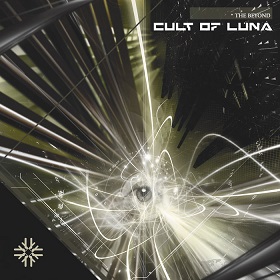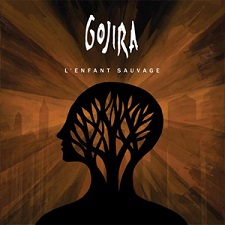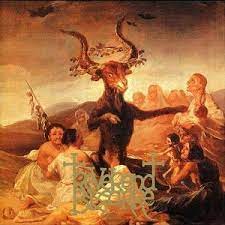
© Nuclear Blast
Such has been the fanfare recently over the return of Swedish 1970s pop darlings Abba, with a new ten-song album and a supposed ‘virtual concert’ where ‘digital avatars’ will perform in the shoes of the band’s now somewhat long-in-the-tooth members, that I’ve wondered if I’m the only person in the world who doesn’t actually like Abba.
Okay, ‘doesn’t like’ is a bit strong. A more accurate verb-phrase would be ‘is totally indifferent to’.
There are a couple of Abba songs that get me tapping my foot in a vague, mindless way, like Gimme! Gimme! Gimme! or Money, Money, Money (both 1979) or the song with which they won the 1974 Eurovision Song Contest, Waterloo – which, come to think of it, was an appropriation of the breezy, sax-laden sound of Roy Wood’s glam-rock band Wizzard. But unlike, say, the entire population of Australia, a country that’s given us such Abba-obsessed cultural phenomena as the cover band Bjorn Again and the movies Priscilla, Queen of the Desert and Muriel’s Wedding (both 1994), I don’t worship the ground that the shiny, 1970s, high-heeled boots of Agnetha, Anni-Frid, Benny and Bjorn have walked on.
However, while the planet’s airwaves turn into the equivalent of the soundtrack of Mamma Mia! (2008), though thankfully without the pained, raspy sound of Pierce Brosnan attempting to sing, I will seek solace in the one type of music that truly matters… heavy metal.
Here’s a quick guide to the heavy metal bands, all of whom have become prominent since the beginning of the new millennium, that I’ve been listening to lately.
Al-Namrood
As this 2015 feature in the magazine Vice noted, “Al-Namrood have never played a live show, because it could result in the entire band being executed.” That’s because the band Al-Namrood (a) play black metal and (b) are Saudi Arabian, two concepts that go together about as harmoniously as serpents and mongooses. According to their guitarist and bassist Mephisto, who, like all the band’s members, has never revealed his real name for his own safety, “Al-Namrood is the Arabic name of the Babylonian king Nimrood, who was a mighty tyrannical king who ruled Babylon with blood and defied the ruler of the universe.” Yes, those sound like pretty black metal things to do. It’s a shame that the band has had to operate so far off the grid because the music by them I’ve heard, its growling vocals and relentlessly thunderous guitars and drums laced with delicious Arabic folk stylings, I’ve found irresistible.
Behemoth
Polish black metal and death metal band Behemoth are similarly unloved by their country’s political and religious establishment. And though the repercussions obviously won’t be as serious as those risked by Al-Namrood in Saudi Arabia, Behemoth’s frontman Adam ‘Nergal’ Darski has recently been convicted of blasphemy and could face imprisonment in the increasingly authoritarian Poland of Andrzej Duda. Actually, politically, Nergal has proved to be a bit of a knobhead in the past and once gained notoriety for wearing a ‘black metal against Antifa’ T-shirt, so it’s ironic he’s become a martyr in the struggle against the forces of extreme, right-wing knobhead-dom.
Behemoth first caught my attention when I listened to their 2018 album I Loved You at Your Darkest, which begins with a choir of creepy children chanting, “I shall not forgive… Jesus Christ… I forgive thee not…” Thereafter, the album is a brilliantly Wagnerian parade of tunes with such titles as God = Dog, Ecclesia Diabolica Catholica and If Crucifixion Was Not Enough. Can’t imagine why those pious Polish politicians don’t like them.

© Earache Records
Cult of Luna
Proof that, musically, Sweden has considerably more to offer than just Abba, Swedish doom metal band Cult of Luna serve up tunes where big, booming slabs of guitar lumber ominously along, accompanied by hollering and shrieking vocals, creating a sound that suggests a world teetering on the brink of collapse while simultaneously being strangely exhilarating and even uplifting. The earliest album of theirs I’ve heard is 2003’s The Beyond, the most recent one 2021’s The Raging River. Though there’s evidence of development and exploration between the two, the basic template is reassuringly the same.
Electric Wizard
Hailing from County Dorset, England, the original members of Electric Wizard bonded in the 1990s over a shared love of horror films, the writings of H.P. Lovecraft and the music of legendary Brummie metal band Black Sabbath. It was from the titles of two Sabbath songs, Electric Funeral and The Wizard (both 1970), that they devised their band’s name. For me, they just seem to get better and better – from early albums like Dopethrone (2000) and Let Us Prey (2002) to their most recent opus, Wizard Bloody Wizard (2017), which contains the deliriously catchy track Necromania.
In fact, someone has stuck a fan video for Necromania on YouTube, its visuals stitched together from such lovable old horror-movie schlock-fests as The Dunwich Horror (1969), Le Frisson des Vampires (1971), Lizard in a Woman’s Skin (1971), All the Colours of the Dark (1972), Baron Blood (1972), Dracula AD 1972 (1972) and The Satanic Rites of Dracula (1973). It captures the essence of Electric Wizard perfectly.

© Roadrunner
Gojira
Several bands have named themselves after Godzilla, Japan’s favourite, radioactive-breathed, city-destroying kaiju, including Godzilla in the Kitchen and Bongzilla. In my opinion, the best of the bunch is the one using the giant reptile’s original Japanese moniker, Gojira. This French death / progressive metal outfit combines shrieking vocals, wailing guitars and thunderous drums – courtesy of drummer Mario Duplantier, whose sound suggests the footfall of the giant lizard itself – with a surprising degree of melody. Well, the melodiousness is perhaps not so surprising, giving that the bandmembers cite Led Zeppelin as a key influence. The 2012 album L’Enfant Sauvage made me fall in love with Gojira, although their most recent one, Fortitude (2021), is pretty good too.
Melechesh
I first heard of the band Melechesh through the artist John Coulthart, whose blog I read regularly and who’s designed the covers for their albums, including 2015’s album Enki. Soon afterwards, I saw Enki on sale in a record shop and bought it out of curiosity. It’s a great album, its storming metallic sound embroidered with such eastern-Mediterranean and Middle Eastern instruments as the sitar, bouzouki, saz and bendir. Melechesh, it transpires, are the propagators of ‘Mesopotamian metal’ which, according to their Wikipedia entry, aims to “create a type of black metal incorporating extensive Middle Eastern influences mainly based on Assyrian and occult themes.” They formed in Jerusalem in 1993 but later relocated to Europe. In the mid-1990s, the city authorities in Jerusalem accused them of ‘dark cult activities’, which probably didn’t encourage them to hang around in Israel.

© Nuclear Blast
Orchid
One afternoon I was in the FOPP record shop on Edinburgh’s Rose Street and the guy behind the counter decided to play a heavy metal album over the store’s PA system. “What’s this?” I demanded, intoxicated by the album’s old-school sound – although as this was Rose Street, I may have been slightly intoxicated already. “It’s The Mouths of Madness,” he replied, “by Orchid!” Then he produced another copy of the album, recorded in 2013, which I bought on the spot. I would have remarked: “ORCHID – obviously stands for OZZY Osbourne / RAINBOW / the CULT / Rob HALFORD / IRON Maiden / Ronnie James DIO!” But I wasn’t able to think that fast.
As I’ve suggested, San Francisco metallers Orchid wear their influences on their sleeves, but especially the influence of Black Sabbath. Now while Black Sabbath, with their doomy sound and the occult preoccupations of their song-titles and lyrics, have been a huge influence on heavy metal generally, later bands have taken that sound and those preoccupations and made them more extreme and exaggerated. But Orchid are reminiscent of Black Sabbath as they were, in a purer, simpler form. I don’t mean that they copy the original band’s songs. Orchid sound like Black Sabbath in their early 1970s prime, if they ‘d existed in a parallel universe where they’d been able to churn out a few extra albums. Similar riffs, but not the same riffs.

© Sinister Figure
Reverend Bizarre
As far as I can tell, quaintly-named doom-metal outfit Reverend Bizarre are the only band on this list who no longer exist. They disbanded in 2007, having produced three albums during the noughties. I own two of those, the excellent In the Rectory of the Reverend Bizarre (2002) and II: Crush the Insects (2005). Sounding like a sludgier, more primordial version of Electric Wizard, this Finnish band was notable for, among other things, its vocalist, the also quaintly-named Albert Witchfinder. He eschewed modish doom-metal growling and shrieking and mainly just crooned forebodingly.
Wolves in the Throne Room
Their name may conjure up images of Game of Thrones, but Wolves in the Throne Room come from the relatively un-sword-and-sorcerous environs of Washington State in the northwestern USA. One of their objectives (to quote Wikipedia again) is “channeling the ‘energies of the Pacific Northwest’s landscape’ into musical form.” Thus, their song titles contain such words as ‘fields’, ‘fog’, ‘lightning’, ‘rain’, ‘rainbow’, ‘stars’, ‘storm’ and ‘woodland’ and their sound has been described as ‘atmospheric black metal’ or ‘ambient black metal’. But there’s still enough ‘black metal’ present in Wolves in the Throne Room’s formula to prevent them sounding serene and bucolic. I have three of their albums – 2006’s Diadem of 12 Stars, 2009’s Black Cascade and 2011’s Celestial Lineage – and think they’re all blisteringly brilliant.
Having finished writing this blog-entry, I now feel an urge to listen to the above nine bands’ albums again, at maximum volume. I’ll probably be deaf afterwards, but at least then there’s no danger of me hearing the new Abba album.

© Southern Lord
